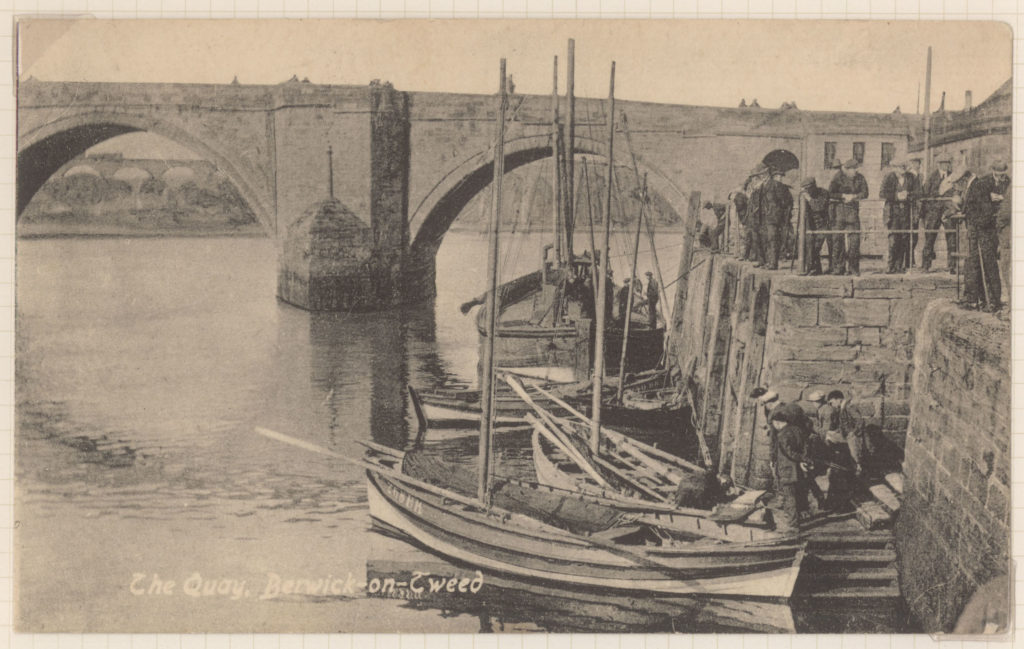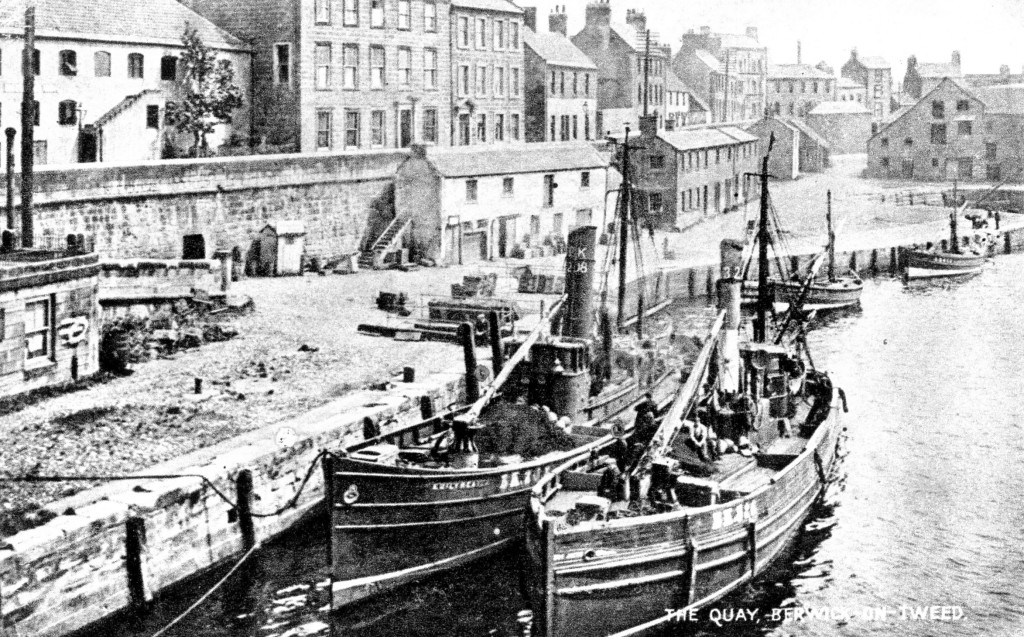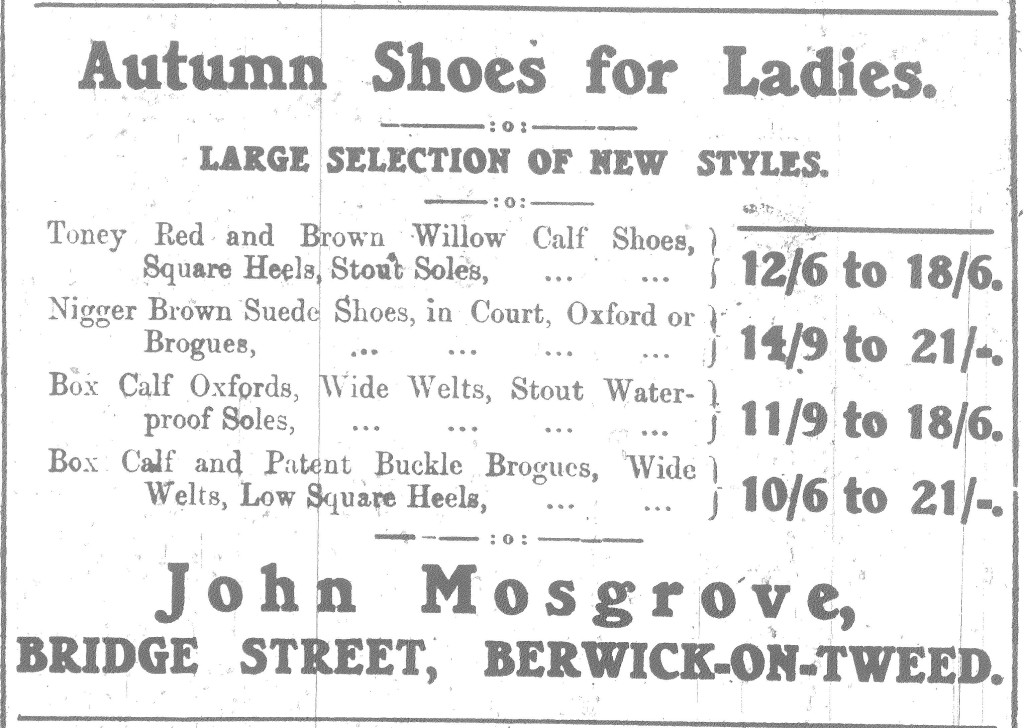
BERWICK OFFICER’S NARROW ESCAPE
TWO B.A.R.C. MEMBERS IN THE RIVER
Canoe Upsets Opposite Boathouse
GALLANT RESCUE BY BERWICK MEN
A sensational affair took place on the Tweed about 9.30 p.m. on Wednesday night, when Capt. F. B. Cowen, M.C., Berwick, and Mr Thos. Smart, Tweedmouth, nearly met their death by drowning as the result of a sailing canoe upsetting near the Tweedmouth side of the river, opposite the Boathouse.
Capt. Cowen and his friend have been frequently out on the river lately, sailing this canoe, and on the night of the accident they were sailing up the “gut” between the fishing bat and the Tweedmouth side when a squall of wind struck the sail and the frail craft overturned.
Tom Smart was lucky enough to fall clear of the boat but Capt. Cowen getting entangled in the sail was held under the water beneath the overturned boat and was being slowly drowned.
THE RESCUE
The accident was observed by many friends at the Boathouse, people on the Tweedmouth side, and a large number of pedestrians on the Old Bridge and New Road. Rescue work was immediately begun. A boat was manned at the Boathouse and pulled with all speed to the scene, while Mr R. J. Moor, a member of the B.A.R.C., who happened to be in his house at West End, was quickly sent for and entered the water and swam out to the boat which was only about 12 yards from the Tweedmouth shore. Mr Thomas, who is at present at the Queen’s Theatre with his Welsh Choir, also took the water and swam out, but being an elderly man was soon exhausted and had to himself seek safety.
The water at the point was about seven feet deep and when the boats arrived on the scene Smart had gone down for the second time and was making rather feeble efforts to keep afloat. Capt. Cowen had been under water all the time and Mr A. A. Crisp dived from a boat fully dressed to assist Mr Moor in the work of rescue. Happily their united efforts were successful. Moor released Capt. Cowen, who was too far gone to struggle and at the same time Smart was pulled aboard and the rescue boat with the aid of an oar where he collapsed.
Moor having raised Capt. Cowen from the bottom handed him to Mr Crisp who bore him to the wherry and safety. The rescuers were in a very exhausted condition and were violently sick owing to having swallowed so much river water.
Medical aid was waiting on the shore when the unfortunate men were landed. Dr T. P. Caverhill and his assistant applying artificial respiration while Dr Badenoch and Dr C. G. Maclagan attended to Smart and assisted on keeping a clear air space. Capt. Cowen was in a bad state and for a time his life was despaired of, but he gradually responded to treatment much to the relief of all present.
GOLF
A start has already been made with preparations for the Northumberland Agricultural Society’s Show to be held on the Magadalene Fields on 15th July. The judging ring is nearly complete, and the grandstand is in process of erection. The two holes affected so far are the “Moat” and the “Cricket Field,” but in a week or so the South end of the course will practically be out of play till after the Show.

On Saturday the Goswick Club ladies meet the Magdalene Fields Club ladies on the town course in a six-a-side match. The home team will be Miss H. F. M. Caverhill, Miss H. Gray, Miss H. Crossman, Miss McKelvie, Miss Gray, Miss Marshall. Goswick – Mrs P. C. Swan, Mrs Marrow, Mrs W. R. McCreath., Mrs T. P. Caverhill, Mrs Collingwood, Miss C. Gough.
The ladies’ June Monthly Medal was played over Goswick Course on Saturday last and was won by Miss Henderson, Coldstream, with 111-26- 85.
After considering the state of the course, the Green Committee have decided to restrict play to 7 holes on and after Monday 14th June. A temporary tee will be made adjacent to No.3 green for play to No. 6 green. The full course must, however, be played in competitions, and members engaged in competitions take precedence at No.7 tee. For the guidance of members the Committee have also decided that a ball lying within 10 yards of any Show structure may, with the consent of opponent or marker, be lifted and dropped no nearer the hole without penalty. If the ball is lying in a hazard, within 10 yards of any Show structure, the ball may be lifted at the option of the player under a penalty of one stroke.
The Green Committee have placed the hollow at the Greens Haven, where the newly erected refreshment hut is situated, out of bounds. Golfers driving into the hollow will require to drive a second ball from the ninth tee.
“NO GAS” THREAT
WORKERS DECIDE TO STRIKE.
SPITTAL MEN AFFECTED
Unless a national settlement of the matters in dispute between the Gasworkers in the United Kingdom and the Gas Companies and Corporations, comes before the night of June 26th, over 1000,000 men employed in the industry will come out on strike at the end of the strike notices.
The demands made by the men are for a 10s per week increase in wages, a 44-hour working week, and double pay for Sundays and holidays.
A ballot was taken recently as to whether members of the Union concerned were in favour of strike action, when 96 per cent of the workers voted in favour of a strike. The position is being laid before the Ministry of Labour.
The gasworkers employed by the Berwick and Tweedmouth Gas Company are affected by the threatened strike. A demand for increased wages was made by them some time ago, but this was withdrawn when a national demand was made by the unions. The seventeen men employed at the Gas Works, Spittal, balloted on the strike proposal recently and unless a settlement comes, they will come out with the rest of the gasworkers in the country on the night of June 26th.
On Wednesday the Ministry of Labour officially invited both sides of the Joint Industrial Council for the industry to meet and try to come to a settlement.
CHEAP FISH
WHY NOT BERWICK?
We learn that the Comrades of the Great War at Alnwick have set about in a business-like way, the provision of cheap fish for the people. The method is to have a list of parties to be supplied regularly and to meet these demands fish are purchased wholesale and given to the customers at a price which is almost 100 per cent. below shop prices. Cod and haddock can be sold by the Comrades at 6d per lb., while the prices charged by fish dealers in Berwick is 1s per lb, for cod and 9d per lb. for haddock.
Why not start this method in Berwick as a means of bringing down prices. Last week on Berwick Quay fishermen got from 8s to 10s per stone for haddocks, and these haddocks were retained in the shops at 9d per lb., an all round rate.

The percentage of profit here is reasonable, but a much larger profit iis taken from cod which is retailed at 1s per lb., after having been purchased on the Quay at from 25s to 38s per box for small, and at about 8d per lb. for large fish. Halibut sells on the Quay at 15s and 16s a stone, and is retailed at 1s 6d per lb. upwards. Crabs can be bought from fishermen at 6s and 7s per kit, yet in a shop a purchaser is charged from 6d to 1s according to size. A kit holds some 30 crabs when well packed.
Of course, it will be said that the fish merchant must have his profit, on account of the work he has to do in handling and gutting the larger fish, but surely if men who have no experience in the fish trade can buy and sell at a profit and let the public have fish at 6d per lb., the fishmonger should go one better.






